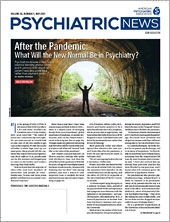Although rates of dementia decreased overall between 2000 and 2016, dementia rates remained higher in Blacks than in Whites, a study in JAMA Neurology has found. The study also found no evidence that the disparity had begun to narrow.
“In some ways, I see these results as encouraging. Black Americans are also benefiting from the reductions in dementia risk we see when we look at the population overall,” lead author Melinda C. Power, Sc.D., an associate professor of epidemiology at George Washington University and director of the GW Institute for Brain Health and Dementia, told Psychiatric News. “In other ways, the results are discouraging. Black Americans still have significantly greater risk of dementia than White Americans, and we haven’t made much progress in reducing this relative disparity.”
Power and colleagues analyzed data from Black and White adults aged 70 years and older who participated in the Health and Retirement Study (HRS) between 2000 and 2016. The HRS is a national study that recruits new participants every six years, with study interviews occurring every other year. The HRS interviews gather data on sociodemographic characteristics, cognitive and physical function, health status, and social engagement. Using several different algorithms, the researchers found a decrease in the proportion of people who had dementia each year over the 16 years studied (prevalence). However, Black people had an approximately 1.5 to 1.9 times higher prevalence of dementia compared with their White peers.
The researchers found mixed evidence to suggest that the proportion of people who developed dementia each year during the 16 years studied (incidence) either stabilized or declined overall. Yet Black people had an approximately 1.4 to 1.8 times higher incidence of dementia compared with White people.
From 2000 to 2016, the prevalence of self-reported, physician-diagnosed hypertension rose from 71% to 83% in Blacks and from 55% to 67% in Whites. The prevalence of diabetes rose from 23% to 42% in Blacks and from 15% to 24% in Whites. Education increased among Blacks, from 64% with less than a high school education in 2000 to 33% with less than a high school education in 2016.
Addressing these disparities will be difficult, said Power.
“Continued disparities in these risk factors likely translate into continued disparities in dementia. [However,] addressing disparities in individual risk factors or in a given disease is hard to do without addressing the broader societal issues, including structural racism, that contribute to them,” she said.
“Sociopolitical factors such as access to education, safe housing, and financial resources contribute to continued disparities,” said Steven Starks, M.D., the representative to the APA Assembly for the Caucus of Black Psychiatrists, who was not involved in the research. He is a geriatric psychiatrist and clinical assistant professor at the University of Houston College of Medicine. “Income and housing data aren’t presented here, yet the data do include educational attainment. In this country and surely for this cohort, educational attainment likely overlaps with socioeconomic factors like income and housing.”
Starks said that awareness of disparities in health care is not enough and that steps must be taken to solve the problems.
“Awareness has to be activated by acknowledging historical and present-day harms and developing true and meaningful connections with Black communities,” he said. “For example, American medicine doesn’t seem bothered by the rates of uninsurance for Black Americans. No one seems alarmed that Black physicians account for 5% of the physician workforce despite the fact that Black Americans make up more than 13% of the U.S. population.”
Starks noted that Black health care professionals disproportionately practice in Black communities.
“Studies show that Black patients have better health outcomes with Black physicians who show more compassion and commitment to their care. Greater advocacy and intentional community partnerships need to come from legacy organizations in American medicine and health care,” he said. “As our profession continues to evolve, we should consider how we might reconstruct and adapt our frameworks to incorporate the values of these disenfranchised physicians, researchers, patients, families, and communities.”
Starks added that each psychiatrist can have an impact on disparities such as those revealed by this study.
“On the individual level, educate yourself about the experiences of the patients and communities you serve,” he said. “Remember the hostility, the harms, the underdiagnosis, the misdiagnosis, the overdiagnosis, the adverse events, the mortality that occur daily in clinical settings to Black patients and create a positive experience for them at each encounter.”
This study was supported by the National Institutes of Health. ■
“Trends in Relative Incidence and Prevalence of Dementia Across Non-Hispanic Black and White Individuals in the United States, 2000-2016” is posted
here.


